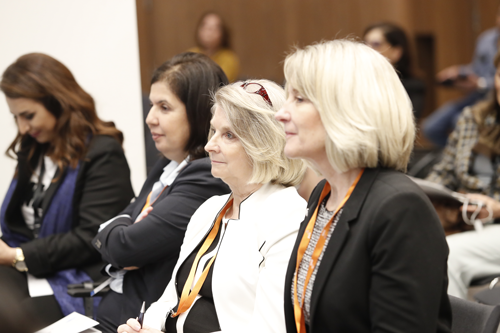
|
|
Luanne Thorndyke, MD, and Janet Hale, PhD, were invited panelists at the “Women Leaders & Health: Empowering women leaders in innovation, medical education and health care delivery” conference held this spring in Beirut, Lebanon. Organized by the Arab International Women’s Forum in partnership with UMass Medical School and the American University of Beirut, the conference brought together regional dignitaries in government and health care, among them the prime minister of Lebanon and delegates of the United Nations Women Fund for Gender Equality.
Dr. Thorndyke and Dr. Hale reflected on the efforts to help women in the Middle East and North Africa overcome barriers to attain leadership roles in medical education and health care delivery.
“Over the past 28 years, I have had the opportunity to live in two Middle Eastern countries with health workforce development visits to multiple other Arab countries,” said Hale, professor of nursing and family medicine & community health and associate dean for interprofessional and community partnerships in the Graduate School of Nursing. “I was reminded of the incredible Arab women with whom I have worked and what I learned from them, as well as the joy of hearing our Arab women colleagues discuss their efforts to become leaders of their professions and their commitment to mentoring, nurturing, encouraging and empowering young women of their countries.”
“With its purpose to bring visibility to the gap in women’s advancement and leadership in STEM disciplines and develop recommendations, attending the conference was an opportunity to contribute by offering our institutional insights,” said Thorndyke, professor of medicine and vice provost for faculty affairs. “I was greatly impressed by the passion, energy and accomplishments of the women panelists from the Middle East, who spoke about the barriers they had overcome to pursue their dreams. The conference provided a powerful platform for these women leaders to conceptualize innovative solutions to advance female leadership in STEM and indeed in all sectors and spheres within the Middle East.”
Thorndyke served on a panel that focused on leadership, mentorship and innovation for women’s empowerment.
She addressed strategies to advance women in medicine and science based upon her work at UMMS and shared insights from her own career journey. She emphasized the need for institutions to provide professional and leadership development and opportunities for advancement to leadership positions, and the strategic benefits for institutions of having women in leadership.
Hale’s panel addressed mentoring the next generation of women leaders in health care and medical education in the Middle East and North Africa regions.
She shared with attendees the rewards and challenges of being a U. S. military and civilian health care leader in education and practice; her role as a leader, mentor and innovator; and the innovation underway in curriculum at UMMS and elsewhere in the United States.
“Our conference successfully brought into focus key challenges and opportunities for women’s leadership in medical education, health care delivery, STEM, research, innovation, sustainability and international development,” said Haifa Fahoum Al Kaylani, chair of the Arab International Women’s Forum. She founded the organization in 2001 to create a better future for women in the Middle East and North African regions by addressing barriers to women’s leadership, especially in public service and health care sectors.
“I was particularly impressed by what women from the region have accomplished considering the immense challenges they faced to achieve their goals as providers and leaders in innovative health care,” said Hale. “They shared their fierce determination to improve the outlook for women in their countries.”
“To travel to a part of the world that is not easily accessible to Americans and to experience a rich culture quite different from our own was an experience of a lifetime,” Thorndyke concluded. “I can only hope that our input and dialogue with conference participants was as beneficial to others as the visit was to us.”
AIWF released its full report on the conference in June. The report includes messages from Chancellor Michael F. Collins and other conference sponsors; detailed proceedings from the panel discussions and conference workshops; and 20 recommendations for further action.
Related stories on UMassMedNow:
Educational Recognition Awards honor teachers at UMass Medical School
UMMS faculty featured in medical education conference in China
UMMS showcases women’s leadership in academic medicine at international conference
New medical and nursing course aims to improve care of military members and veterans